Are you struggling to stay hydrated? While we all know the importance of drinking enough water, did you know that incorporating fruits with high water content into your diet can also contribute to your hydration goals?
Fruits are not only delicious but also packed with essential nutrients that can replenish your body’s fluids. In fact, most fruits have a surprisingly high water content, making them an excellent choice for staying hydrated.
In this article, I’ll delve into the water content of various fruits and explore the benefits of including them in your hydration routine. Whether you prefer pineapples, strawberries, oranges, blueberries, raspberries, or other water-rich fruits, you’ll find valuable information and tips to quench your thirst and nourish your body.
Key Takeaways:
- Many fruits have a high water content, making them a refreshing and hydrating snack.
- Incorporating water-rich fruits into your diet can help replenish your body’s fluids and prevent dehydration.
- Water-rich fruits not only hydrate but also provide essential vitamins, minerals, and fiber.
- Pineapple, strawberries, oranges, blueberries, and raspberries are among the fruits with the highest water content.
- Stay tuned as we explore the water content of these fruits and discover delicious ways to incorporate them into your diet.
The Importance of Hydration for Your Health and Happiness
Proper hydration is essential for our bodies to function properly. Water plays a significant role in regulating body temperature, transporting nutrients, and eliminating waste products. It also helps prevent health issues like constipation, kidney stones, and urinary tract infections. Dehydration can lead to headaches, fatigue, and muscle weakness, and in severe cases, it can be life-threatening. Recognizing the symptoms of dehydration is crucial in maintaining hydration levels.
Water: The Lifeline of Our Bodies
Water is the fundamental building block of life, comprising up to 60% of our body weight. It is essential for the proper functioning of every cell, organ, and system in our body. Staying hydrated allows us to maintain optimal physical and mental performance throughout the day.
“Water plays a vital role in maintaining body temperature, lubricating joints, and protecting sensitive tissues.”
The Benefits of Proper Hydration
When we are adequately hydrated, our bodies experience numerous health benefits. Hydration supports healthy digestion, aids in nutrient absorption, and promotes efficient metabolism. It helps improve skin health by keeping it moisturized and supple. Additionally, staying properly hydrated can enhance cognitive function, boost mood, and improve overall mental well-being.
The Dangers of Dehydration
On the other hand, dehydration can have harmful effects on both our physical and mental health. Mild to moderate dehydration can result in fatigue, dizziness, dry mouth, and decreased physical performance. Severe dehydration requires medical attention and may lead to complications such as confusion, rapid heartbeat, and even unconsciousness.
Recognizing the Symptoms of Dehydration
It is important to be aware of the signs of dehydration so that we can take immediate action to rehydrate our bodies. Some common symptoms of dehydration include:
- Feeling thirsty
- Dry mouth or throat
- Headaches
- Decreased urine output
- Fatigue
These symptoms serve as a reminder to replenish our fluids and prevent dehydration from affecting our overall health and well-being.
By prioritizing hydration, we can maintain our health and promote a happy, active lifestyle. Make it a habit to drink water regularly throughout the day, especially during physical activities or exposure to hot weather. Along with water, incorporate hydrating fruits, such as watermelon, cucumber, and citrus fruits, into your diet to boost your water intake and enjoy the added health benefits they provide.
Remember, staying hydrated is a simple yet powerful investment in your overall well-being.
Recognizing the Symptoms of Dehydration
When it comes to staying adequately hydrated, recognizing the signs of dehydration is crucial. By being aware of the symptoms, you can take immediate action and prevent dehydration from becoming a major problem.
Symptoms of dehydration may include:
- Feeling thirsty
- Having a dry mouth
- Experiencing headaches
- Feeling dizzy or lightheaded
- Feeling fatigued or having low energy
- Decreased urine output
In addition to these common symptoms, other signs of dehydration can include:
- Dark-colored urine
- Dry skin
- Muscle cramps
It’s important to listen to your body and pay attention to these signals. If you experience any of these symptoms, it’s a clear indication that your body needs more fluids. Ignoring them can lead to further complications.
One of the simplest ways to combat dehydration is by drinking water. But did you know that you can also boost your hydration levels by consuming fruits with high water content?
Drinking water and consuming water-rich fruits can help rehydrate the body and alleviate symptoms of dehydration. Let’s explore some of the fruits that can aid in hydration in the next sections.
Incorporating Water-Rich Foods for Hydration
Along with drinking water, consuming water-rich foods is an excellent way to stay hydrated. Fruits with high water content not only replenish fluids but also provide essential vitamins, minerals, and fiber. Incorporating these fruits into your diet can support overall health and hydration.
One popular water-rich fruit is watermelon. With a water content of over 90%, watermelon is a hydrating and refreshing snack. It is also packed with vitamins A and C, as well as lycopene, an antioxidant that promotes heart health. Enjoy watermelon slices on a hot day or try it in a delicious summer salad.
Another hydrating fruit is cucumber, consisting of about 96% water. Cucumbers are low in calories and high in antioxidants, vitamins, and minerals. They make a great addition to salads, sandwiches, or as a refreshing snack on their own.
Hydration doesn’t stop with fruits. Some vegetables are also excellent sources of water. For example, celery is about 95% water and is a great option for adding hydration to your diet. It is also packed with fiber, vitamins, and minerals. Include celery in your salads, soups, or enjoy it with some hummus for a healthy snack.
Remember, it’s important to combine water intake with hydrating foods to maintain optimal hydration levels. Incorporating water-rich fruits and vegetables into your diet is not only a delicious way to stay hydrated but also supports overall health.
Fruits and Vegetables with High Water Content
| Fruit/Vegetable | Water Content |
|---|---|
| Watermelon | Over 90% |
| Cucumber | Approximately 96% |
| Celery | Around 95% |
In the next sections, we will explore more fruits with high water content and how they can help you stay hydrated.
Pineapple – A Hydration Superstar
If you’re looking for a fruit that can help you stay hydrated, look no further than pineapple. With its high water content of over 85%, pineapple is an excellent choice to quench your thirst and replenish your body’s fluids.
But the benefits of pineapple go beyond hydration. This tropical fruit is also packed with essential nutrients that can improve your overall health. Pineapple is a rich source of vitamin C, which boosts your immune system and helps fight off illnesses.
In addition to vitamin C, pineapple contains an enzyme called bromelain, known for its digestive benefits. Bromelain aids in digestion and can reduce inflammation in the body, providing relief for digestive issues and joint pain.
There are countless ways to incorporate pineapple into your diet. You can enjoy it as a refreshing snack, add it to smoothies for a tropical twist, or use it in salads to add a burst of flavor. The options are endless!
To inspire your pineapple creations, here are a few recipes to try:
- Pineapple Smoothie Bowl
- Grilled Pineapple and Chicken Skewers
- Pineapple Salsa
- Pineapple Upside-Down Cake
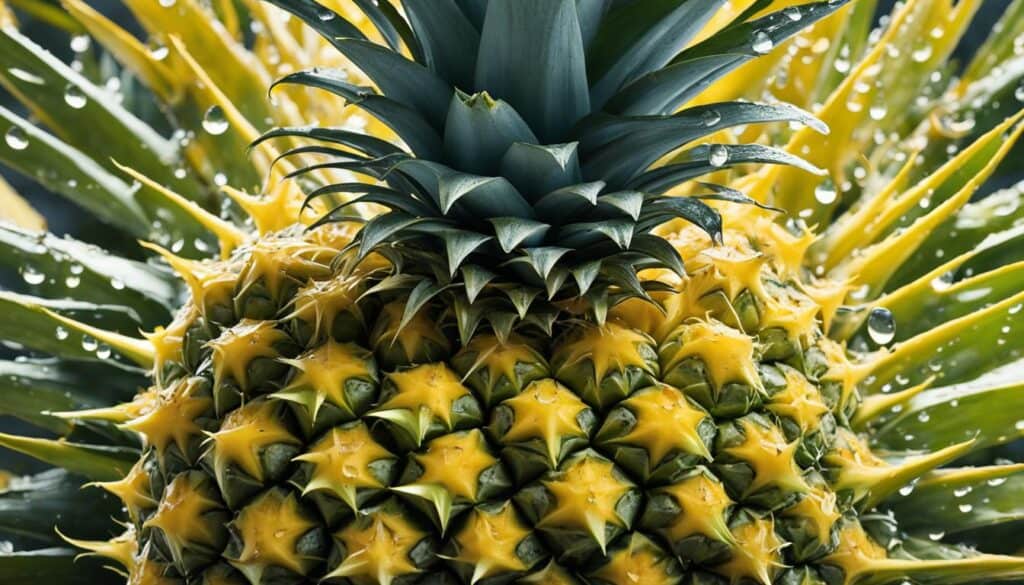
So, the next time you’re feeling thirsty, reach for a slice of pineapple. Not only will it help quench your thirst, but it will also provide you with a delicious and nutritious boost. Cheers to hydration and the health benefits of pineapple!
Strawberries – Juicy and Hydrating
When it comes to staying hydrated, strawberries are a delicious and refreshing option. These vibrant red berries have a high water content of around 90%, making them an excellent choice for maintaining hydration levels. But that’s not all – strawberries are also packed with essential vitamins, minerals, and antioxidants that provide numerous nutritional benefits.
The impressive water content of strawberries ensures that they not only quench your thirst but also help replenish your body’s fluids. Whether enjoyed on their own or added to your favorite dishes, strawberries can contribute to your daily hydration goals.
These little fruits are versatile and can be incorporated into various recipes, adding a burst of flavor and hydrating goodness. Consider adding strawberries to your yogurt or oatmeal for a nutritious and hydrating breakfast. Alternatively, freeze them for a refreshing snack or use them as a topping for desserts.
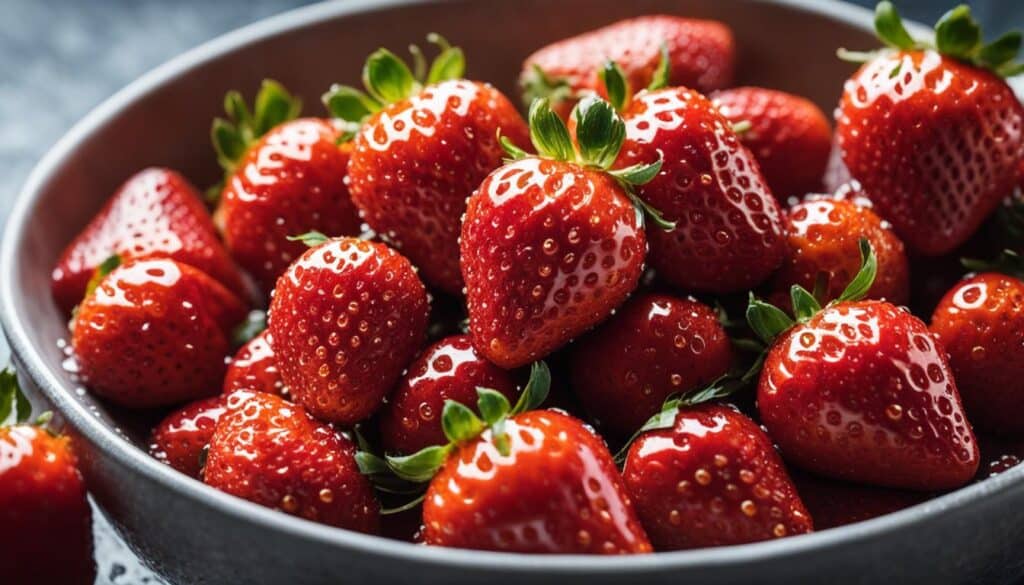
Nutritional Benefits of Strawberries
Strawberries aren’t just hydrating; they are also packed with important nutrients that support overall health. Here are some key nutritional benefits of strawberries:
“Strawberries are a rich source of vitamin C, which is essential for immune function, collagen production, and iron absorption. They also contain fiber, folate, potassium, and antioxidants known as anthocyanins, which have been linked to various health benefits.”
Strawberry Recipes
Ready to incorporate strawberries into your diet and unlock their hydrating properties? Here are a few delicious strawberry recipes to inspire you:
- Strawberry Spinach Salad: Combine fresh strawberries, baby spinach, sliced almonds, and feta cheese. Toss with a light balsamic vinaigrette for a refreshing and nutritious salad.
- Strawberry Smoothie: Blend frozen strawberries, banana, Greek yogurt, and a splash of almond milk for a satisfying and hydrating smoothie.
- Strawberry Overnight Oats: Combine rolled oats, chia seeds, almond milk, and sliced strawberries in a jar. Let it sit overnight for an easy and nutritious breakfast.
| Recipe | Ingredients | Instructions |
|---|---|---|
| Strawberry Spinach Salad | Fresh strawberries Baby spinach Sliced almonds Feta cheese Balsamic vinaigrette | 1. Slice strawberries and combine with baby spinach in a bowl. 2. Add sliced almonds and crumbled feta cheese. 3. Drizzle with balsamic vinaigrette and toss gently to combine. |
| Strawberry Smoothie | Frozen strawberries Banana Greek yogurt Almond milk | 1. Add frozen strawberries, banana, Greek yogurt, and almond milk to a blender. 2. Blend until smooth and creamy. Adjust the consistency by adding more almond milk if desired. 3. Pour into a glass and enjoy. |
| Strawberry Overnight Oats | Rolled oats Chia seeds Almond milk Sliced strawberries | 1. In a jar, combine rolled oats, chia seeds, and almond milk. 2. Stir well and add sliced strawberries. 3. Cover the jar and refrigerate overnight. 4. In the morning, give it a good stir and enjoy. |
Oranges – Bursting with Hydration
When it comes to hydrating fruits, oranges are a true powerhouse. With their high water content and abundance of essential nutrients like vitamin C and potassium, oranges provide a refreshing and nutritious way to stay hydrated.
Oranges, with their juicy flesh and tangy flavor, are not only delicious but also a great source of hydration. They consist of approximately 87% water, making them an excellent choice to replenish your body’s fluids.
But hydration is not the only benefit of oranges. These citrus fruits are packed with vitamin C, which boosts the immune system and supports overall health. Oranges also contain potassium, a mineral that helps regulate blood pressure and supports heart health.
There are various ways to incorporate oranges into your diet for hydration and overall well-being. You can enjoy a fresh orange as a snack, or squeeze them to make freshly squeezed orange juice. Another option is to add sliced oranges to salads or use their zest to enhance the flavor of your favorite dishes.
If you’re looking for exciting ways to include oranges in your meals, try our delicious orange recipes. From refreshing orange smoothies to tangy orange-glazed chicken, our recipes will not only keep you hydrated but also tantalize your taste buds.
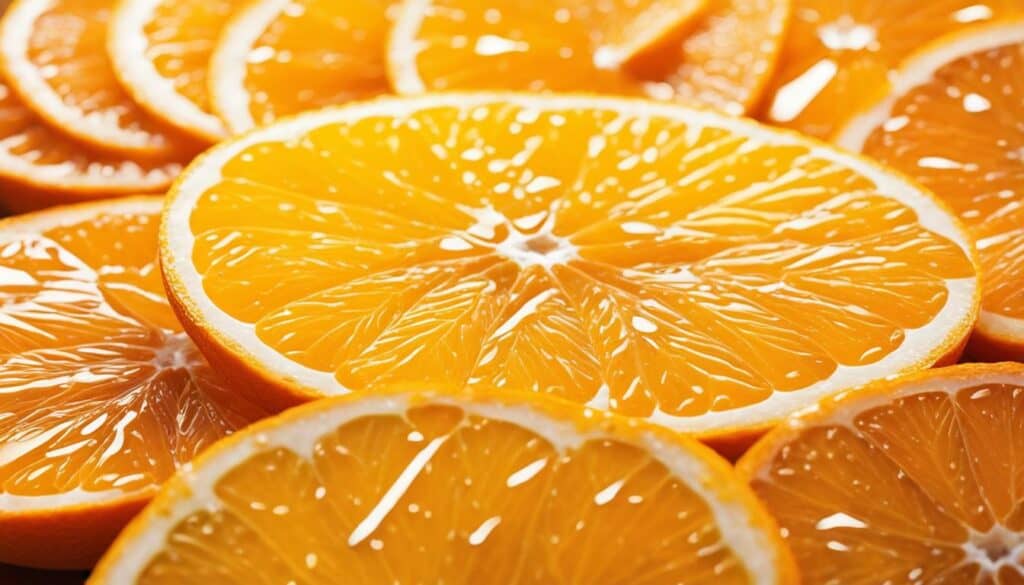
Stay hydrated and enjoy the benefits of oranges as you quench your thirst with this juicy fruit!
Blueberries – Hydration with a Twist
When it comes to staying hydrated, blueberries are a delicious and refreshing choice. These tiny berries boast an impressive water content of 80%, making them a hydrating snack that can help quench your thirst on a hot summer day. But the benefits of blueberries don’t stop at hydration.
Blueberries are also packed with antioxidants that provide a range of health benefits. These antioxidants help protect your cells from damage, reduce inflammation, and support cognitive function. In fact, studies have shown that the antioxidants in blueberries can improve memory and delay brain aging.
Not only are blueberries good for your brain, but they also contribute to overall well-being. Blueberries are a rich source of vitamin C, vitamin K, and fiber, which are all essential for optimal health. Their sweet and tangy taste makes them a versatile ingredient that can be added to a variety of dishes.
If you’re looking for ways to incorporate blueberries into your diet, we’ve got you covered. Here are a few delicious blueberry recipes to try:
- Blueberry Smoothie: Blend fresh blueberries, Greek yogurt, almond milk, and a drizzle of honey for a refreshing and hydrating smoothie.
- Blueberry Oatmeal: Top your morning oatmeal with a handful of blueberries and a sprinkle of cinnamon for a nutritious and hydrating breakfast.
- Blueberry Salad: Toss together mixed greens, blueberries, feta cheese, and walnuts for a hydrating and flavorful salad.
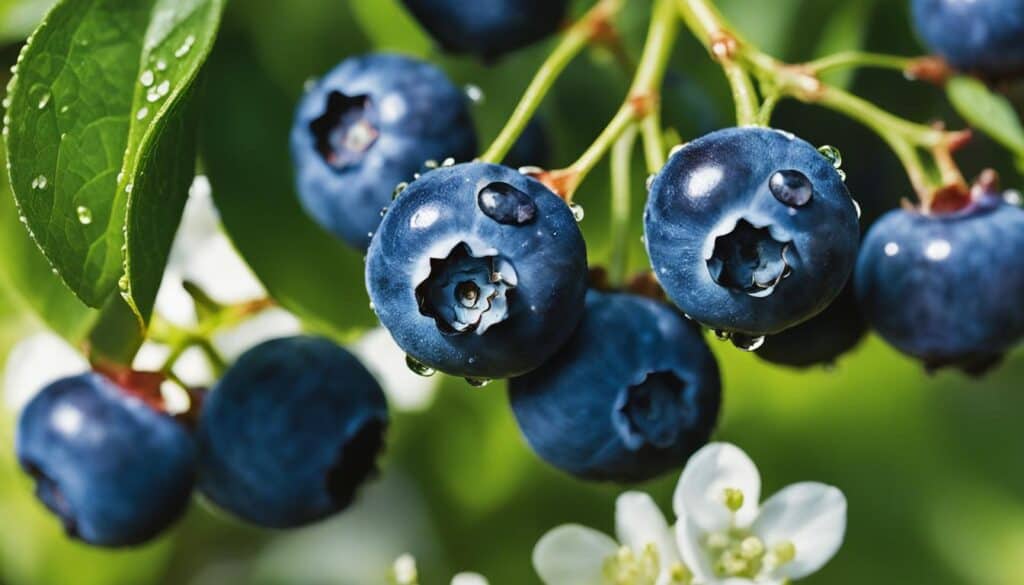
Whether you enjoy them fresh, frozen, or in a recipe, blueberries are an excellent choice for staying hydrated and reaping the many health benefits they offer. So go ahead and indulge in these juicy berries while boosting your hydration levels and nourishing your body.
Raspberries – Refreshing Hydration
When it comes to staying hydrated, raspberries are a delicious and hydrating option to include in your diet. These vibrant berries are not only packed with flavor but also have a high water content, making them an excellent choice for staying hydrated.
Raspberries have a water content of around 85%, which means that they can help replenish your body’s fluids and keep you hydrated throughout the day. Whether you enjoy them on their own as a snack or incorporate them into various recipes, raspberries provide a refreshing burst of hydration.
Aside from their hydration benefits, raspberries are also rich in essential nutrients. They are an excellent source of vitamin C, which supports immune function, and fiber, which aids in digestion and helps maintain healthy cholesterol levels.
To make the most of the nutritional benefits of raspberries, try incorporating them into your diet with these delicious raspberry recipes:
- Raspberry smoothie: Blend raspberries, yogurt, and a banana for a refreshing and hydrating smoothie.
- Raspberry salad: Add raspberries to a fresh salad for a burst of flavor and hydration.
- Raspberry parfait: Layer raspberries with yogurt and granola for a satisfying and hydrating dessert.
With their vibrant color, juicy texture, and numerous health benefits, raspberries are a fantastic addition to any diet. They offer a refreshing way to stay hydrated while providing essential nutrients your body needs.
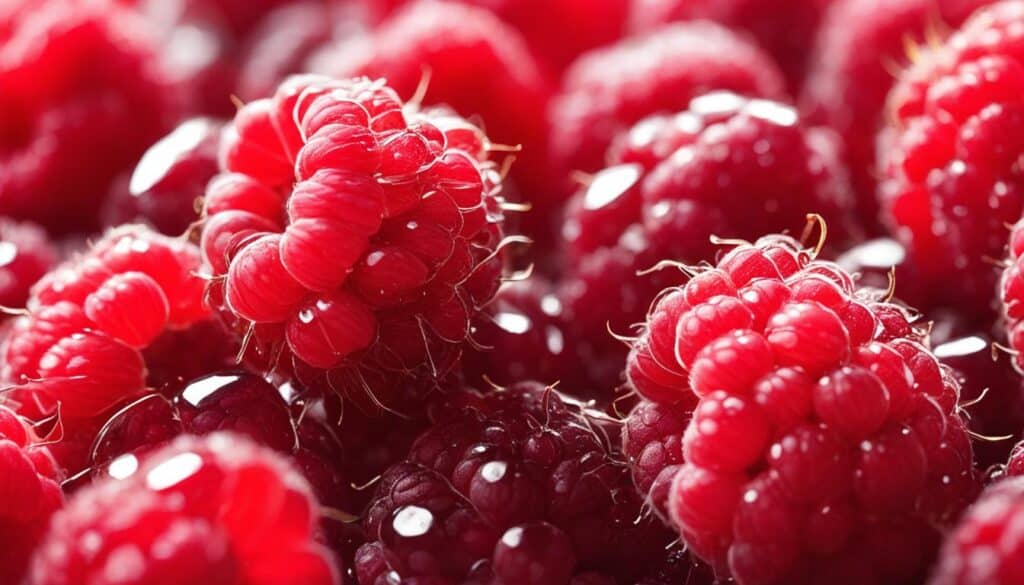
So why not indulge in the deliciousness of raspberries and reap the rewards of their hydration and nutrition? Try out these raspberry recipes and enjoy the refreshing benefits these berries have to offer.
Conclusion
To maintain overall health, it is crucial to stay hydrated. While drinking enough water is essential, incorporating water-rich fruits into your diet can also contribute to your hydration goals. Fruits like pineapple, strawberries, oranges, blueberries, and raspberries not only provide hydration but also offer essential nutrients for optimal health. Remember to drink an adequate amount of water throughout the day to complement the hydrating benefits of these fruits.
Hydration is the key to a well-hydrated body. Enjoy a refreshing pineapple smoothie, a bowl of juicy strawberries, or a glass of freshly squeezed orange juice to quench your thirst and provide hydration. Add a handful of blueberries to your morning cereal or indulge in a raspberry-filled dessert to stay hydrated and enjoy the many other health benefits these fruits offer.
| Fruit | Water Content |
|---|---|
| Pineapple | 85%-90% |
| Strawberries | 90% |
| Oranges | 85%-90% |
| Blueberries | 80% |
| Raspberries | 85% |
By incorporating these water-rich fruits into your diet, you can maintain proper hydration levels and enjoy their delicious flavors. Remember to drink water regularly, listen to your body’s signals for thirst, and make hydrating fruits a part of your daily routine. Stay hydrated, stay healthy!
Final Thoughts
Proper hydration is vital for maintaining good health. While drinking plain water is the best way to stay hydrated, incorporating fruits with high water content into your diet can provide additional hydration and essential nutrients. It’s important to monitor your water intake and be aware of the symptoms of dehydration to maintain optimal hydration levels.
One of the key hydration tips is to make sure you drink enough water throughout the day. Aim for at least eight glasses of water, and adjust your intake based on your activity level and the climate you’re in. Remember, staying hydrated is especially important during hot weather or when engaging in physical activities.
In addition to drinking water, including hydrating fruits like pineapple, strawberries, oranges, blueberries, and raspberries in your diet can be beneficial. These fruits not only provide hydration but also offer vitamins, minerals, and fiber. Try incorporating them into your meals, snacks, or smoothies for a refreshing and hydrating boost.
Maintaining hydration levels is an ongoing process, so pay attention to your body and its hydration needs. By prioritizing water intake and incorporating hydrating fruits, you can ensure that your body stays properly hydrated, supporting your overall health and well-being.
FAQ
How much water is in most fruits?
Most fruits have a high water content, ranging from 80% to 90%. This makes them a great choice for staying hydrated.
Why is water content important in fruits?
Water content in fruits is important because it helps replenish fluids in the body, promotes hydration, and contributes to overall health.
What are some hydrating fruits?
Some hydrating fruits include pineapples, strawberries, oranges, blueberries, and raspberries. These fruits have a high water content and provide essential vitamins and minerals.
How do water-rich fruits contribute to hydration?
Water-rich fruits not only help rehydrate the body but also provide essential nutrients like vitamins, minerals, and fiber, supporting overall hydration and health.
How can I incorporate water-rich fruits into my diet?
You can incorporate water-rich fruits into your diet by enjoying them fresh, adding them to smoothies, salads, or yogurt, or using them in recipes.
What role does hydration play in overall health?
Adequate hydration is crucial for maintaining proper body functions, regulating body temperature, transporting nutrients, and eliminating waste products. It also helps prevent health issues like constipation, kidney stones, and urinary tract infections.
What are the symptoms of dehydration?
Symptoms of dehydration include feeling thirsty, having a dry mouth, experiencing headaches, dizziness, fatigue, decreased urine output, dark-colored urine, dry skin, and muscle cramps.
How can I prevent dehydration?
To prevent dehydration, it is important to drink enough water throughout the day and consume hydrating foods such as water-rich fruits. Monitor your water intake, stay hydrated, and be aware of the symptoms of dehydration.
Can fruits alone provide enough hydration?
While fruits with high water content can contribute to hydration, it is important to remember that drinking plain water remains the best way to stay hydrated. Fruits can provide additional hydration along with essential vitamins, minerals, and fiber.
What are some tips for maintaining hydration levels?
Some tips for maintaining hydration levels include monitoring your water intake, listening to your body’s thirst cues, incorporating hydrating foods like water-rich fruits into your diet, and staying hydrated throughout the day, especially during physical activity or hot weather.

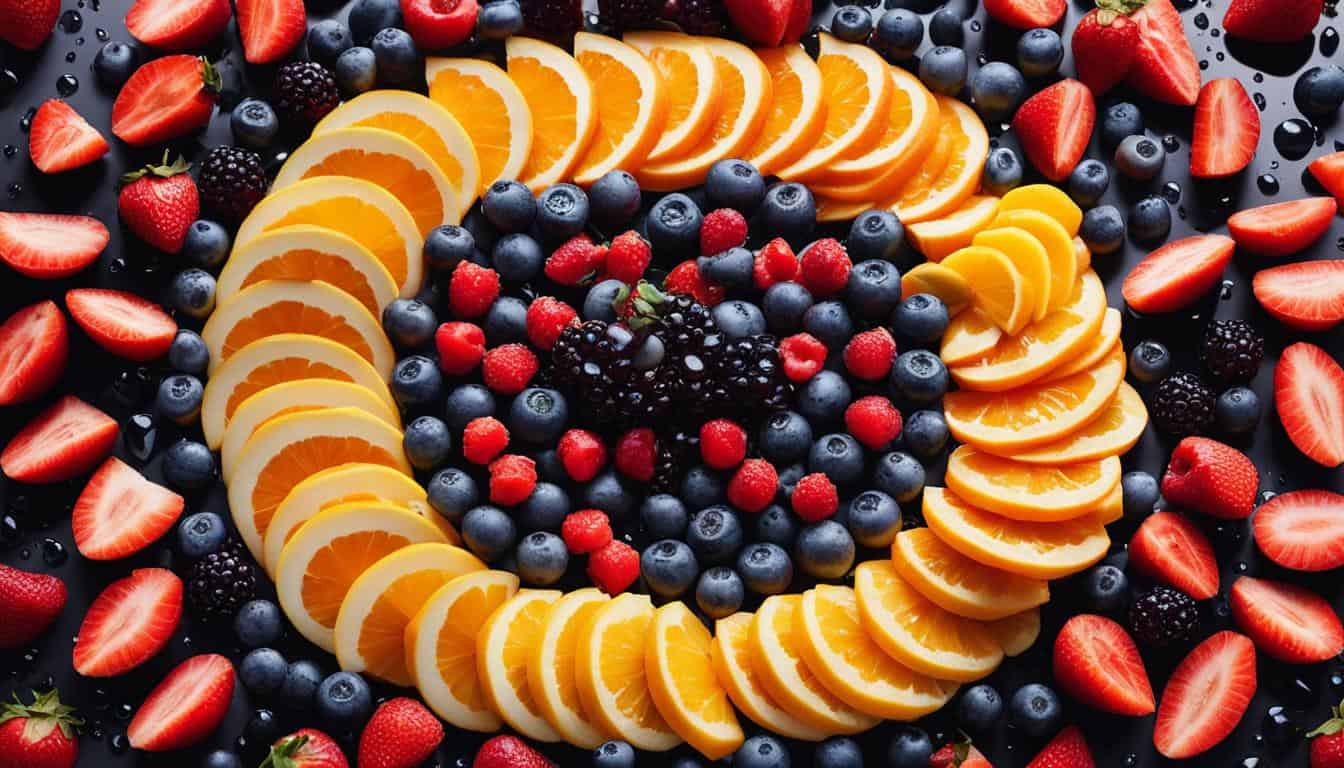



Leave a Reply